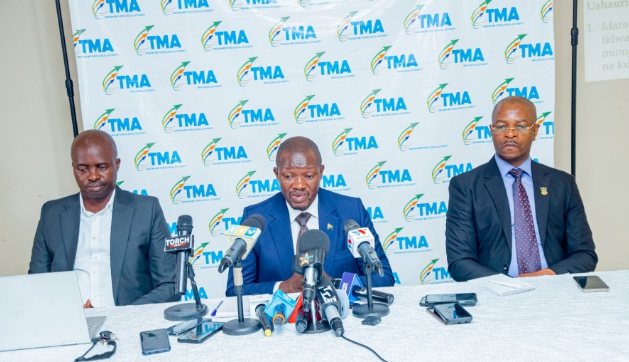TMA issues alert ahead of below normal rains

DAR ES SALAAM: THE Tanzania Meteorological Authority (TMA) has issued a seasonal weather outlook that has significant implications for various sectors in unimodal areas, which receive rains once a year.
The sectors include agriculture, livestock, fishery, tourism, wildlife, construction, transport, energy, water and mineral resources.
Speaking to journalists yesterday in Dar es Salaam, TMA Acting Director General Dr Ladislaus Chang’a said there is an elevated chance of Below Normal to Normal rains over Kigoma, Tabora, Katavi, Singida and Dodoma regions.
However, Normal to Below Normal rains are expected over Njombe, Iringa, Mbeya, Songwe, Rukwa, Ruvuma, Mtwara and Lindi regions together with the southern part of Morogoro region.
Normal to Below Normal rains expected over these areas are likely to commence during the second and third weeks of November.
The rains are expected to start during the third and fourth week of October, 2025 over Tabora, Katavi and Kigoma regions and spreading to Rukwa, Songwe, Mbeya, Iringa, Njombe regions and southern part of Morogoro region during the second and third week of November, 2025.
“Farmers are advised to prepare their fields timely, plant, weed and use appropriate inputs while considering soil moisture conditions. They should also apply best practices and technologies to conserve water on farms,” Dr Chang’a stressed.
The anticipated Below Normal rains in most areas may result in soil moisture stress, affecting crop growth and development and reducing yields for rain-fed crops.
He encouraged farmers to seek appropriate information and advice from agricultural extension officers based on the seasonal forecast for their specific districts when selecting appropriate seeds and crops.
He further said livestock keepers are advised to put in place good plans for the use and conservation of water and animal feeds.
Pastoralists and fishers are advised to use weather forecast updates and adhere to the advice provided by extension officers to minimise possible adverse impacts and capitalise on expected favourable conditions during the season.
The authority also urged the relevant authorities to improve various infrastructures in the parks and game reserves and raise awareness among the community to take appropriate actions due to the likely impacts.
“Wildlife may encroach into surrounding human settlements, increasing the risk of disease transmission to domestic livestock,” he noted.
The transportation sector is likely to benefit from the expected suppressed rains during the season. However, short periods of enhanced rains may interrupt operations. Stakeholders in this sector are advised to act appropriately in the implementation of construction, repair and preventive maintenance of various infrastructures.
A decrease in reservoir water levels and river flow is likely, which could reduce water availability for various uses and potentially lead to conflicts between large and small consumers. Hydroelectric power generation may be negatively affected. However, these conditions may favour the construction of new power projects and the exploration and extraction of oil and gas.
He advised local authorities to strengthen and maintain clean water distribution systems to ensure adequate supply for households and other critical sectors.
They should also improve drainage systems and provide community education on appropriate preventive and adaptive measures.
“Relevant authorities responsible for public health and individuals are advised to take necessary health precautions needed to minimise the expected negative impacts on health.
The Disaster Management Department, in collaboration with relevant stakeholders, is urged to continue coordinating and implementing plans to mitigate potential impacts.





